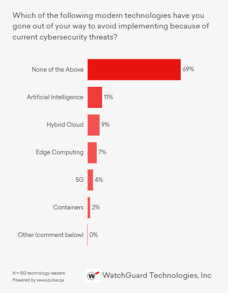Implementing the 5 Most Challenging Technologies in Cybersecurity
Technology plays a fundamental role in the transformation process that companies have embraced in recent years. However, tech decision-makers have some reservations about adopting the latest technologies to avoid putting corporate security at risk.
These are the findings of the Pulse survey of 150 technology leaders, in which 65% say they will avoid implementing AI, Hybrid Cloud, Edge Computing, 5G and Container Security because of the complexity required to implement them securely.

How to deploy the 5 latest solutions securely:
- In the case of the hybrid Cloud, despite the advantages it offers in terms of scalability, greater control of critical workloads in the private environment and cost savings, some companies slow down migration to the Cloud because of inexperience using this technology, the complexity involved in implementing it, and because they do not have the budget needed to invest in it.
- Including multi-factor authentication is key to deploying this technology properly, as it is the first step to replace implicit trust with an evaluated and explicitly adaptive trust, which is essential in hybrid work environments. This creates a resilient security structure that allows organizations to implement the benefits gained from remote working and adapt the hybrid Cloud internally.
- Edge computing is the technology that enables the integration, management and virtual governance of data obtained from IoT devices. However, there is a risk of data leakage during implementation so EDR solutions must be deployed to monitor connections to endpoints at all times, with an integrated data security module that monitors, discovers, classifies, and protects organizations’ data.
- These detection and response endpoint solutions also serve to protect technologies that incorporate artificial intelligence. Thanks to AI algorithms, large volumes of data, attributes, events and threat intelligence are processed and deliver highly efficient service levels for expanding and accelerating the reduction of the attack surface. They help prevent, detect and respond to cybersecurity attacks of any nature, executed with any type of known or unknown malware, ransomware, APTs or living-off-the-land techniques. The right solutions at the endpoint prevent system manipulation and potential data leakage.
- 5G provides access to more opportunities for business expansion thanks to higher data transfer speeds over the Internet. However, there is a risk of not having the necessary capacity to monitor them after evolving from 4G to 5G, as well as when using unsecured network connections. The use of a reliable network connection, as well as relying on an MSP, will serve both to protect the company and manage the new volume of data received.
- As regards container security, secure tools must be deployed to avoid making them an "easy target" for hackers and they must be connected in a robust way to ensure isolation between containers.
There is an array of security solutions on the market. That’s why, when choosing which solution is the best for your organization, it is essential to check that it offers comprehensive and reliable security for all types of technologies that are implemented both now and in the near future, ranging from the most common to the most disruptive in the digital ecosystem. This enables security to be scaled quickly within the company's implementation processes, in response to the rapidly changing landscape.
